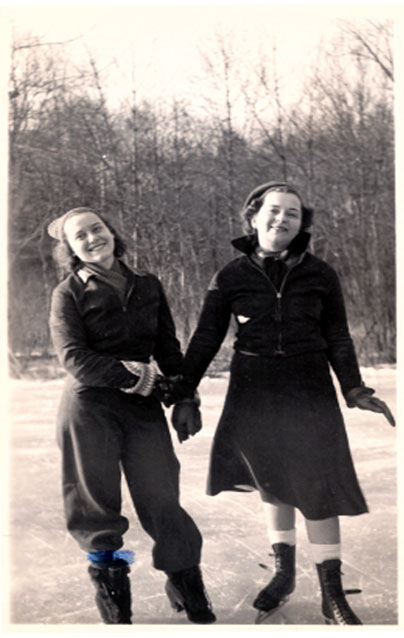
That's Unusual. Isn't It?
When they first moved into the big house, they heard peeping from upstairs and discovered that, for the sake of warmth, chicks had been hatched in the top dresser drawer in a closet in one of the bedrooms.
Betty: That's unusual, isn't it?
Estelle (roaring with laughter): I would hope so!
Housekeeping:
Betty: Jean ... used to boss me around. And I wouldn't boss anyone around.
Estelle (laughing): That's not unusual for the older child. She was busy. She was babysitting, and she did cooking.
A BRIEF LIFE OF JEAN, THE ELDEST DAUGHTER:
Jean never put hardship behind her. After an arranged marriage to a man who turned out to be an alcoholic, she became a practical nurse. Widowed early, and always poor, she raised two daughters, as best she could. Later in life, Jack bought an apartment for his big sister in Palm Beach, Florida, the town to which his wife's wealthy parents had already retired. Whenever we drove up from Tamarac to visit her, Jean's loving heart would swell, and she would cook for us the same traditional foods her mother used to cook. As soon as my father saw the steaming Jewish-style chicken stew with potatoes, carrots and raisins, and the baked noodle pudding, also with raisins, emerge from the kitchen, his little-boy eyes would grow huge, and he would dig right in. I think my Auntie Jean had the sweetest smile of anyone I have ever known. .
Holidays:
If, as is often said, God is in the details, many of the details in the Kaufman household were theocentric.
Estelle: My mother had this huge kitchen. On the holidays, all the services were in our house, it was called a schul [synagogue], and they all came. We had a long table, and that table, after services, was filled with all kinds of Jewish goodies -- pickled herring, baked challah -- and she used to prepare all of that. An Oneg Shabbat, they call it today. And the kids were off from school, so they would come, too. And, while the parents were praying, we would have a ball playing with each other. It was such a good childhood. And that's where we developed these very strong friendships. When I get together with my friend, Ruth Goldstein, who's now Ruth Werthheimer, nobody in the world exists except us. And the games! We invented games that nobody ever heard of. It would be dark upstairs, and half of us would be separated into those that hid, in the closets, under the beds, and half ...
Betty: Hide and Seek.
Estelle (laughing): And those of us who were ... the ones who seek ... would make up the craziest, zaniest stories, expressions, to get them to laugh. And, if they laughed, we'd find them.
The Family Photograph:
Betty: You know that family picture we have? He put us all in the truck one Saturday and took us to the photographer.
Estelle: It's a lovely picture. I was about seven.
Betty: I was about twelve.
Estelle: I remember they wanted to put me further back, and I argued with the photographer, "No, no, my new shoes won't show!" How funny it is, the things you can remember from years ago.
Betty: It's interesting.
Estelle: My father sat, and my mother stood. Is that still the case with photography?
AFTER THE BIG HOUSE:
After the big house, the family lived for about four years in "the little house" on nearby Possum Hollow Road, where Sam added two extra rooms. There was a stuffed owl on the fireplace in the living room of this house. Many years later, my parents' living room in their retirement condominium featured ceramic owls (as well as ceramic turtles).
Many of my childhood summers, during the 1940s, were spent in the Possum Hollow house. My memories tend toward the Manichean. On one side are idyllic frolics on the property with my dear cousins and our friends, some of them the children of those with whom Betty and Estelle once played hide-and-seek. My Proustian sense memory is the smell of cedar needles. On the other side is my grandfather's slow, excruciating death from cancer, during which the sisters took turns nursing the screaming patient, while we children were warned, as we played on, against making unseemly noise.
THE BEGINNINGS OF BETTY'S AND ESTELLE'S EDUCATION:
Betty and Estelle's schooling followed the pattern of family migration, but approximately in reverse: Jamesburg, to New Brunswick, to New York City. Although Estelle was the better student, Betty played a key role in Estelle's education.
By the time my mother started, Jean and Harry were already attending the town's one-room schoolhouse --one teacher for eight classes, first to eighth grade. Since mostly Russian and Yiddish were spoken at home ("Russian, when they didn't want us to understand"), my mother started school knowing very little English. She also told me she was embarrassed by the hand-me-downs she wore, which were usually too small, and by the fact that she was cross-eyed, because her parents did not want to pay for a corrective operation.
"Drown of Snow":
Betty: One day, the boy behind Jean stuck her long hair into his inkwell. The boys said they would "take care of" the culprit after school. On the way out, they threw him in a ditch full of snow. I thought he would drown of snow there. The bus -- the wagon --came along, and they pulled him out of the ditch. He'll never forget that.
Author's note: A Voice for My Grandmother includes a fuller account of my childhood days at the Possum Hollow farm. The .pdf can be found HERE.

The Piker Press moderates all comments.
Click here for the commenting policy.